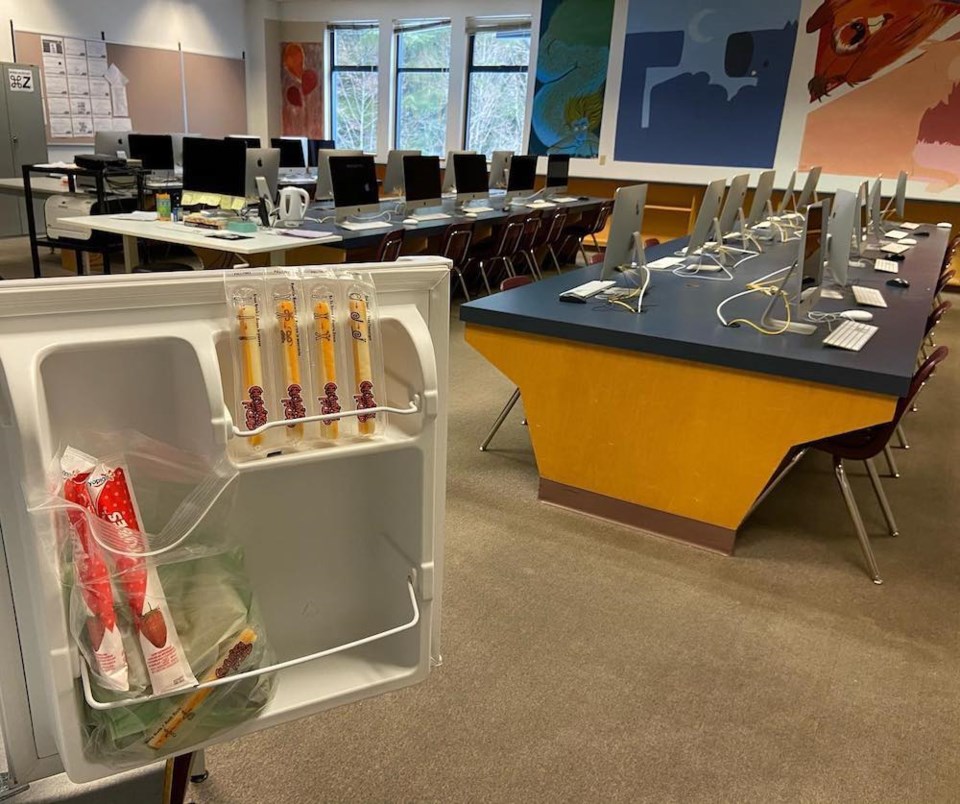As food security and community development manager for the Whistler Community Services Society (WCSS), Gizem Kaya has given back to the resort community in innumerable ways. But few moments in her career compared to the day last week when she got to see the seed of her idea blossom into a reality.
“It was a really emotional day, especially after a very challenging year of the COVID pandemic and essential servicing where we’ve seen challenge after challenge,” Kaya said. “This is one of the positive things that came out of COVID.”
Last Thursday, Feb. 25, Kaya was on-hand for the delivery of 28 mini-fridges to Whistler Secondary School (WSS), an initiative that was borne out of the COVID-19 pandemic to help fight hunger and food insecurity among Whistler’s youth. Now, each WSS classroom, as well as several common areas, house the self-serve fridges, allowing students to pick from a variety of fresh-made sandwiches, wraps, fruit, veggies, and other healthy snacks at any time throughout the school day.
Made possible in part due to funding from the Breakfast Club of Canada, dozens more mini-fridges will be placed in classrooms at Spring Creek Community School, École La Passerelle and Whistler Waldorf School in the coming weeks.
For several years, thanks to funding from the Whistler Blackcomb Foundation, WCSS has organized its school lunch program, which, pre-pandemic, took the form of a communal fridge that was open to all students. But with concerns around sanitation, as well as students being divided into distinct cohorts, the communal concept presented a number of challenges.
“We did our best to accommodate those needs until now, by sending grab-and-go items with no fresh foods. But that never really sat well for us and it doesn’t get too healthy for the kids in that sense,” Kaya explained. “The more fresh food you can provide, the more accessible food you can provide, the more kids are going to eat it. They’re going to eat healthier, too.”
The old system, which required students to ask permission from a teacher to access the communal fridge, also came with a certain stigma attached that WCSS was eager to break down.
“We talk about this word [stigma] all the time. What does it mean?” asked WCSS executive director Jackie Dickinson. “It means any kid going up to [the fridge], sanitizing it, grabbing that wholesome piece of food and then going back to their desk, and another kid looking over and saying, ‘I can do the same.’ It’s normalizing it and supports the behavioural learning needs of that classroom. Everyone comes out of the equation in a positive way: the child, the family, the teacher.”
According to WCSS data, the initiative couldn’t come at a better time. In 2019, the school lunch program served 23,800 meals and snacks to Whistler youth. In 2020, a year that saw in-school learning suspended for nearly three months, that number jumped to more than 40,000.
“The goal is to normalize this if you’re hungry,” said Kaya. “There are multiple reasons why kids come to school without food. It could be mental health issues, it could be very busy lives at home, it could be as simple as a forgotten lunch, or it could be that kids are going through a growth spurt and the parents don’t realize it.”
WCSS has also beefed up its food-service infrastructure to meet the added capacity, which included the purchase of industrial refrigerators and dishwashers, as well as the hiring of a dedicated food security coordinator, Cara Burrow.
On March 1, WCSS also launched its new Kids Can Cook program, a culinary lesson and meal kit that the non-profit is offering for free, or as a paid service to families that want to contribute what they can or sponsor another family’s kit.
It’s all part of WCSS’ effort to shift perceptions of what a food bank can be, and remove the negative associations connected to food insecurity.
“This year is an especially challenging year where everybody has experienced what financially restricted individuals go through in other years,” Kaya said. “So it’s OK to come and grab that food, it’s so OK to ask for help. We just want to make sure we’re removing every possible barrier and meeting the needs of the community.”




